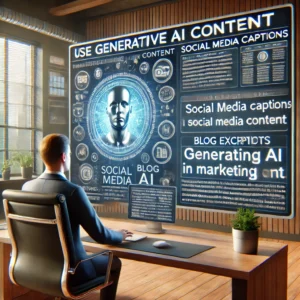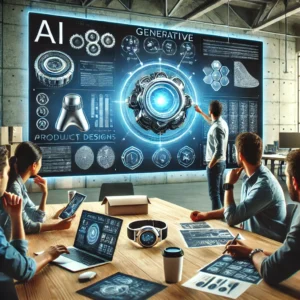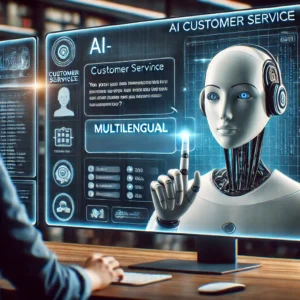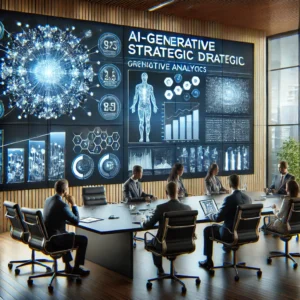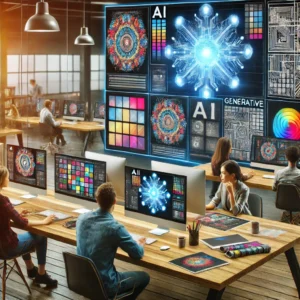Generative AI rapidly reshapes the business landscape, providing innovative solutions across industries. This article explores the latest trends and applications of generative AI, including content creation, product design, customer service, and strategic decision-making. Through examples, case studies, and expert insights, readers will understand how generative AI impacts businesses, enhances creativity, and drives productivity. Discover the challenges and ethical considerations accompanying these advancements and gain insight into the future potential of generative AI in transforming the business sector.
AI in the Business Sector
The advent of generative AI has introduced new possibilities for businesses, pushing the boundaries of automation and innovation. Unlike traditional AI, which follows pre-programmed logic, generative AI leverages deep learning and neural networks to create original content, designs, and solutions. By analyzing vast datasets and learning patterns, generative AI tools can autonomously generate everything from written content and art to strategic business solutions and product designs.
This article examines the latest trends and transformative applications of generative AI in the business world. We’ll explore how businesses are utilizing these tools to enhance creativity, productivity, and strategic decision-making while discussing the challenges and ethical concerns that come with their adoption.
Key Applications of Generative AI in Business
Generative AI is impacting various aspects of business operations. Here are some of the most significant areas where generative AI is making a difference:
1. Content Creation and Marketing
Generative AI has revolutionized content creation, enabling businesses to produce high-quality, engaging material at scale.
- Automated Content Writing: AI-powered platforms like Jasper and Copy.ai assist marketers by generating blog posts, social media captions, and email campaigns. These tools analyze data to create tailored content that resonates with specific audiences.
- SEO Optimization: Generative AI tools use algorithms to create content that aligns with SEO best practices, ensuring higher visibility on search engines and driving more traffic to business websites.
- Ad Copy and Creative Assets: AI can generate multiple versions of ad copy and visual content, allowing marketers to A/B test and optimize their campaigns more effectively.
2. Product Design and Development
Generative AI is being utilized to streamline product design and development, speeding up innovation cycles and enhancing product features.
- AI-Driven CAD Tools: Generative design tools like Autodesk Fusion 360 employ AI to create optimized product designs. By inputting design parameters, engineers receive AI-generated design options that maximize efficiency and performance.
- Prototyping and Simulation: Generative AI enables rapid prototyping by simulating different design scenarios and identifying the best solutions based on specified criteria.
- Customization and Personalization: Businesses use AI to design personalized products for consumers, such as custom clothing, furniture, and electronics, aligning with market trends for individualized experiences.
3. Customer Service and Chatbots
AI-driven chatbots powered by generative AI provide more natural, context-aware interactions, enhancing customer service and user satisfaction.
- Conversational AI: Chatbots like those powered by OpenAI’s GPT models deliver human-like conversations that respond to customer queries more accurately and efficiently than traditional scripted bots.
- Multilingual Support: Generative AI tools support multi-language capabilities, expanding customer service options and improving customer experience across different regions.
- 24/7 Availability: These AI systems provide around-the-clock customer support, reducing the workload on human customer service agents and ensuring customers receive timely assistance.
4. Strategic Decision-Making and Data Analysis
Generative AI assists businesses in making data-driven strategic decisions by analyzing vast datasets and generating actionable insights.
- Predictive Analytics: Generative models analyze historical data and forecast future trends, helping businesses anticipate changes in the market and adjust their strategies proactively.
- Scenario Planning: AI can generate simulations for various business scenarios, allowing decision-makers to explore potential outcomes and develop contingency plans.
- Financial Reporting and Analysis: Generative AI automates the creation of financial summaries, highlighting key metrics and trends in complex datasets, which aids stakeholders in making informed decisions.
5. Creative Industries and Design
The creative industry has embraced generative AI for its ability to push the boundaries of artistic and design possibilities.
- Graphic and Web Design: AI tools generate layouts, graphics, and web design elements that speed up the design process and inspire creative solutions.
- Video Production: Generative AI assists in creating video scripts, editing content, and even generating deepfake technology for film production.
- Music Composition: AI-driven music tools help composers create new music tracks or remix existing ones, expanding the possibilities for media and entertainment industries.
Benefits of Generative AI for Businesses
The use of generative AI brings several advantages that can significantly enhance business operations:
- Increased Productivity: By automating repetitive and time-consuming tasks, generative AI allows employees to focus on more complex and strategic work, boosting overall productivity.
- Cost Savings: Generative AI can reduce costs associated with manual content creation, design processes, and customer service operations.
- Enhanced Creativity: Generative AI can provide creative ideas and solutions that may not be immediately apparent to human teams, sparking innovation.
- Scalability: Businesses can scale their operations more efficiently with the help of AI-driven tools that handle large volumes of data and repetitive tasks.
Challenges and Ethical Considerations
While generative AI offers substantial benefits, it also poses certain challenges and ethical concerns that businesses must address.
1. Intellectual Property and Copyright Issues
The use of generative AI in content creation raises questions about who owns the output and whether it infringes on existing copyrighted material.
- Ownership of AI-Generated Work: Determining who holds the rights to AI-generated work—whether the user, developer, or AI model itself—is complex and varies by jurisdiction.
- Plagiarism Concerns: Generative AI can produce content similar to existing works, raising concerns about potential plagiarism and copyright infringement.
2. Bias and Fairness
AI models are only as unbiased as the data on which they are trained. Generative AI can unintentionally produce biased content, which could impact business reputation and inclusivity.
- Diverse Training Data: Ensuring that training data represents a wide range of perspectives is essential to minimize biases in generative outputs.
- Bias Detection Tools: Businesses should employ AI tools that detect and mitigate bias to ensure fair and equitable AI-generated solutions.
3. Dependence on Technology
Relying heavily on generative AI can create a dependence that limits the development of human skills and creativity.
- Balancing Automation and Human Creativity: While AI can enhance creativity, it should complement rather than replace human insight and originality.
- Skills Development: Businesses should invest in training employees to work alongside AI, maintaining a balance between human and machine capabilities.
4. Data Privacy and Security
Generative AI relies on data to function effectively. Ensuring data privacy and securing sensitive business information is crucial.
- Data Protection Measures: Businesses must implement robust data protection measures to prevent data leaks or misuse.
- Regulatory Compliance: Adhering to data privacy regulations, such as GDPR, is necessary when using data-driven AI solutions.
Case Studies: Generative AI in Action
Case Study 1: OpenAI’s GPT in Content Marketing
A leading marketing firm utilized OpenAI’s GPT model to create tailored content for various client campaigns. The AI generated blog posts, email templates, and social media captions, which saved the team hours of manual work and boosted overall engagement metrics by 20%.
Case Study 2: Autodesk and Generative Product Design
Autodesk’s generative design software enabled a manufacturing company to reduce material usage by 30% while maintaining product strength. The AI model created thousands of design options based on predefined parameters, allowing engineers to choose the most efficient design.
Case Study 3: AI-Powered Customer Support by Lemonade
Lemonade, an insurance company, uses AI-driven chatbots to handle customer queries and process claims. The chatbot’s ability to generate human-like responses improved response times and customer satisfaction while reducing operational costs.
Case Study 4: Creative Music Composition with Amper Music
A digital media company used Amper Music to create background music for promotional videos and ads. The generative AI tool allowed non-musicians to customize music tracks quickly, enhancing the quality of video content and reducing the need for external composers.
Case Study 5: Predictive Analytics in Retail
A major retail chain implemented generative AI to analyze customer data and predict purchasing patterns. The AI-generated insights informed inventory management and promotional strategies, leading to a 15% increase in sales over six months.
The Future of Generative
The potential of generative AI in the business sector continues to grow as technology evolves. Here are some future trends and areas of development:
- Integration with Other Technologies: Generative AI will increasingly be integrated with technologies such as augmented reality (AR) and the Internet of Things (IoT) to create more immersive business solutions.
- Personalized Customer Experiences: Businesses will leverage AI to create highly personalized customer interactions and products, enhancing customer satisfaction and loyalty.
- Collaborative AI: Future AI systems will function as co-creators with human teams, providing creative suggestions and supporting strategic decision-making.
- Ethical and Sustainable AI: More focus will be placed on creating ethical, transparent, and sustainable AI practices, ensuring that generative AI contributes positively to society.
- Enhanced Cybersecurity: AI tools will evolve to include advanced cybersecurity measures, protecting data and minimizing the risk of breaches.
FAQ
Q1: What is generative AI, and how is it used in business?
A1: Generative AI uses deep learning models to create original content, designs, and solutions. In business, it’s used for content creation, product design, customer service, and strategic decision-making.
Q2: How can generative AI benefit businesses?
A2: Generative AI enhances productivity, reduces costs, boosts creativity, and allows businesses to scale operations more efficiently. It also provides valuable insights for strategic planning and customer engagement.
Q3: What are the challenges of using generative AI in business?
A3: Challenges include intellectual property concerns, data privacy issues, potential biases in AI outputs, and dependence on technology that might hinder human skill development.
Q4: How does generative AI impact customer service?
A4: Generative AI enhances customer service by enabling chatbots and virtual assistants to provide accurate, context-aware responses, improving response times and customer satisfaction.
Q5: What is the future of generative AI in business?
A5: Future developments include integration with other technologies, increased personalization, collaborative AI systems, and a focus on ethical, sustainable AI practices.
Generative AI is transforming the business landscape by automating tasks, enhancing creativity, and supporting decision-making processes. While it offers immense potential, businesses must navigate challenges and ethical considerations to harness its benefits responsibly. With continued advancements, generative AI is set to play an even more pivotal role in the future of business.
